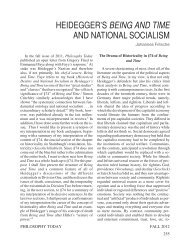Why Saying “I'm Sorry” Isn't Good Enough: The Ethics of Corporate ...
Why Saying “I'm Sorry” Isn't Good Enough: The Ethics of Corporate ...
Why Saying “I'm Sorry” Isn't Good Enough: The Ethics of Corporate ...
You also want an ePaper? Increase the reach of your titles
YUMPU automatically turns print PDFs into web optimized ePapers that Google loves.
<strong>Ethics</strong> <strong>Corporate</strong> Apologies<br />
corporate public apology. Instead <strong>of</strong> simply applying general ethical theory to the<br />
apology, this paper looks for norms in the communicative act itself. I argue that corporate<br />
apologies differ in some significant ways from both private, personal apologies and<br />
collective, nation-state apologies and that these differences should be considered when<br />
evaluating the ethics <strong>of</strong> corporate apologies.<br />
Second, I identify and briefly explored the largely ignored roles played by what I call<br />
“role contamination”, by context, and by the speaker’s ethos and audience pathos in<br />
ethically good apologies. <strong>The</strong> management, legal, and psychological literature has tended<br />
to focus on compensation to victims or acknowledgement <strong>of</strong> norm violations (Fehr et al,<br />
2010) and to overlook the important ethical dimension imbedded in the full rhetorical<br />
context <strong>of</strong> corporate apologies. For example, although the CEO’s acceptance <strong>of</strong> his or her<br />
firm’s responsibility for harm in an apology is surely important (Kador, 2009), such<br />
acceptance by itself does not suffice to make a CEO’s apology ethically good. <strong>The</strong> tone<br />
and formality <strong>of</strong> an apology matter, as does the setting for the apology. All <strong>of</strong> these<br />
factors influence what the recipients <strong>of</strong> an apology hear and thus whether they will have a<br />
good reason to treat the apology as, in principle, trustworthy. So CEOs need to consider<br />
such elements when constructing their apologies.<br />
<strong>The</strong> paper concludes with some reasons why it may not be possible to specify all<br />
elements <strong>of</strong> an effective apology. <strong>The</strong> actual audience reception <strong>of</strong> a given apology is a<br />
highly contingent matter. Ethicists should concentrate, therefore, on what makes a<br />
pr<strong>of</strong>fered apology, in principle, trustworthy instead <strong>of</strong> on apology efficacy with a given<br />
audience. This issue is one on which ethicists can make significant contributions, given<br />
4

















